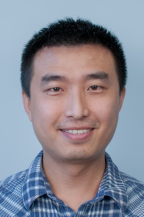Dr. Yifan Peng is an assistant professor of population health sciences in the Division of Health Informatics. After receiving his Ph.D. in computer science from the University of Delaware in 2016, Dr. Peng worked as a research fellow at the National Center for Biotechnology Information. He also completed master's degrees at the University of Delaware and Peking University in China.

Dr. Yifan Peng
What got you involved in health informatics?
My research is motivated by the integration of clinically inspired approaches to machine learning and the use of these approaches to better understand decision-making in clinical systems. During my doctoral and post-doctoral training, I focused on using linguistic structures of biomedical and clinical texts along with deep learning models to extract different types of biomedical and clinical information and facilitate medical image analysis. However, when adopted in a specific domain, such as radiology, these techniques should be combined with extensive domain knowledge to improve efficiency and accuracy. We can begin to fill this void by taking advantage of clinical natural language processing (NLP), image analysis techniques, and deep learning to understand complex representations and unsupervised features.
Tell us about your research
My ultimate goal is to bridge the gap between machine learning and medical informatics. I am particularly interested in constructing a radiology-specific knowledge graph by applying NLP, image analysis, and deep learning to analyze big data. From there, I want to develop a reporting system to generate structured reports semi-automatically. I anticipate that such research would contribute to advancement in understanding of the radiological world and promise to enhance clinical communication and patient-centric care. My near-future goal, which is also the goal of my NIH Pathway to Independence Award (K99/R00), is to weave machine learning, text-mining and image analysis together, and build automatous systems with a higher-level understanding of the clinical world.
The following three goals represent possible directions of my future research. First, I want to construct a comprehensive and easily accessible radiology-specific knowledge graph. Second, I want to empower the knowledge graph with clinical images. Third, I have always maintained a keen interest in the multimodal machine learning strategy, which aims to build models that can process and relate information from multiple modalities such as electronic medical record and genomic data. In the future, I would like to explore creation of joint representations that can incorporate individual unimodal representation into the multimodal space. Taken together, I expect my long-term research to have important impacts by allowing medical personnel to consider different dimensions of clinical/scientific data to find the best viable treatment methods for a complex medical condition. This will improve diagnostic performance, provide consistent recommendations for follow up, and ultimately assist creation of high-quality information services relevant to public health.
What expertise do you bring to this new role?
As a Ph.D. in computer science, I have both a broad knowledge of fundamental areas, as well as a deep knowledge of current findings in deep learning, biomedical text mining, and machine learning. Moreover, as an active research scientist, I can also bring cutting-edge examples to inspire students, discuss state-of-the-art experimental results in my classes, and provide opportunities for students to experience research in my lab.
Why did you choose Weill Cornell Medicine?
My motivation for seeking the tenured-tracked position at Weill Cornell Medicine was to receive the additional experience, stable funding for long-term and high-impact research and gain access to a wide range of scientific expertise. This unique opportunity will set the stage for me to become a professor in the fields of clinical natural language processing and image analysis.
I am very excited about this opportunity as I share the Department of Population Health Sciences' research interest in health sciences. I believe my collective research experiences in computational medicine, particularly in clinical text mining and medical image analysis, will strongly complement and synergize with ongoing research endeavors in the department. Moreover, I am very enthusiastic about the prospect of collaborating with faculty members at Weill Cornell Medicine and Cornell University who are working in the field of machine learning, clinal data science, and health services.
- Highlights

